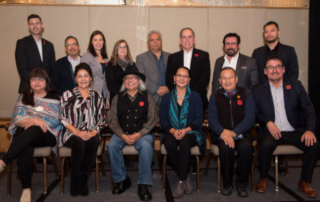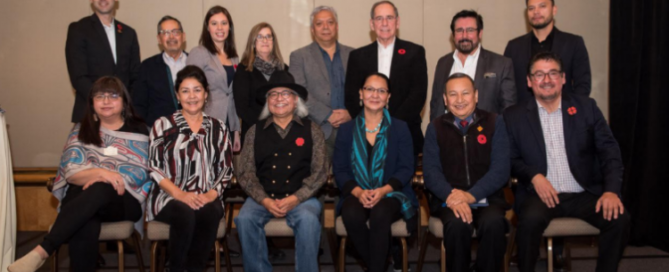-
FNTC: NEWS
Summary of FNTC COVID-19 Related Measures
In response to the needs of First Nations and taxpayers alike during the COVID-19 Pandemic, the FNTC has been working hard to ensure all First Nations have the flexibility needed to administer their tax systems while rapidly responding to the ongoing pandemic.
Effective May 21, 2020, the Commission approved the COVID-19 Pandemic Emergency Response Standards, 2020. These Standards amend several Commission Standards in response to the pandemic.
FMA First Nations
Facilitating Council Meetings Held by Videoconference or Teleconference
The Commission has amended Section 11 of the Standards for the Submission of Information Required under Section 8 of the Act, 2018 to make it easier to submit laws when council approved the law during a teleconference or videoconference.
When council meets by teleconference or videoconference, a First Nation may not able to submit an originally signed and dated law after the meeting. Under the revised standards, a certification letter may be provided as evidence that a law was duly enacted by a quorum of Council, and a certificate may be attached to the front of the law. The certification letter confirms a law was approved by Council, at a duly convened meeting conducted via teleconference or videoconference, with quorum present throughout. The certificate confirms that the document provided is a complete version of the duly enacted law.
FNTC has also developed an alternative enactment clause for use in the Annual Laws and Local Revenue Laws, which reflects the format of the meeting and specifies that a quorum of Council was present. For example:
THIS LAW IS HEREBY DULY ENACTED by the Council at a duly called and conducted Council meeting conducted by [videoconference OR teleconference] on ______________, 2020, at which the required quorum of __ councillors was present throughout.
Instructions for submitting an certified Local Revenue Law to the FNTC and copies of the FNTC Sample Certification Letter and Certificate can be obtained by contacting Tracey Simon, FMA Registrar at tsimon@fntc.ca.
FMA Registry
FNTC requires original laws be submitted to the Commission and placed in the Registry. We will remain flexible regarding the submission of original signed laws. We request all First Nations submit their duly enacted originally signed laws at their earliest convenience once it is safe to do so.
Open Houses and Public Meeting Required by the Standards May Be Held Remotely in 2020
We also understand that certain notification requirements, such as hosting open houses, public meetings, and taxpayer meetings are not currently safe. We have amended the Standards respecting Notices relating to Local Revenue Laws, 2018 to enable these notification requirements to be conducted via teleconference or videoconference during the 2020 year.
Enabling Rate Relief in 2020
For First Nations using CPI to set their rates, section 7 of the Standards for First Nation Annual Tax Rates Laws, 2017 has been amended. First Nations may provide tax relief by lowering their rates in 2020, and then setting their 2021 rates as though the 2020 rates had increased by CPI.
For those First Nations that typically set their rates using reference jurisdiction tax rates, section 8 of the Standards for First Nation Annual Tax Rates Laws, 2017 has been amended to enable First Nations to reduce their rates in 2020 to provide tax relief, while returning to reference jurisdiction rate setting for the 2021 year.
Enabling Zero-Interest Reserve Fund Borrowing
To stabilize annual local revenues and permit local service provision to remain unhindered, subsection 7.2 of the Standards for First Nation Property Taxation Laws, 2016 and section 8 of the Standards for First Nation Expenditure Laws, 2017 have been amended. A First Nation needing money to provide local services may borrow from a reserve fund, interest-free, for a maximum of 5 years. This change would require amending the property taxation law to enable the borrowing.
Amending Laws – Requesting Exemptions to Notice Periods and Notification Requirements
First Nations interested in implementing a mitigation measure or amending their property taxation law should contact their FNTC tax advisor, as amendments to property taxation laws are subject to the notification requirements pursuant to sections 6 and 8 of the FMA. To enable an expedient response by First Nation governments, the Commission will consider requests for exemptions from these requirements. FNTC has developed sample exemption request letters to support COVID-related amendments without requiring a First Nation to adhere to the 30-day notification period.
Proposed Federal Mitigation Support
The FNTC continues to await the development and implementation of a federal mitigation support program. In anticipation of an announcement by the federal government, the Commission has amended section 2 of the Standards for First Nation Expenditure Laws, 2017. A First Nation’s annual budget would be required to set out as revenues, any monies received through a federal tax deferral program. These monies would then be allocated as an expenditure in their annual expenditure law.
s. 83 First Nations
Facilitating Council Meetings Held by Videoconference or Teleconference
Many First Nation Councils are holding meetings by videoconference or teleconference. This may impede Council from submitting an originally signed and dated by-law after the meeting. FNTC has developed a by-law approval certification letter, which may be provided as evidence that a by-law was duly enacted by a quorum of council. We have also developed a certificate to attach to the front of the by-law, which confirms that the document provided is a complete version of the duly enacted by-law.
FNTC has also developed an alternative enactment clause for use in the Annual By-laws and Local Revenue By-Laws, which reflects the format of the meeting and specifies that a quorum of Council was present. For example:
THIS BY-LAW IS HEREBY DULY ENACTED by the Council at a duly called and conducted Council meeting conducted by [videoconference OR teleconference] on ______________, 2020, at which the required quorum of __ councillors was present throughout.
Instructions for submitting a certified Local Revenue By-law to the FNTC, copies of the FNTC Sample Certification Letter and the Certificate can be obtained by contacting Lilian Richards, S. 83 Registrar and Records Manager at lrichards@fntc.ca.
s. 83 Registry
FNTC requires original by-laws be submitted to the Commission and placed in the Registry. We will continue to be flexible regarding by-law submission, and request all First Nations submit their duly enacted originally signed by-laws once it is safe to do so.
Mitigation Measures
Many First Nations are considering providing taxpayer relief through mitigation measures such as deferrals, discounts, rate reductions and grants. If your First Nation wishes to discuss developing a mitigation measure, please contact your FNTC Advisor. Some measures, such as delayed tax notices may be implemented administratively. However, some measures may require amendments to property taxation by-laws.
Requesting Exemptions to Notice Periods and Notification Requirements
Amendments to property taxation by-laws are subject to notification requirements. In supporting First Nations to respond swiftly, the Commission will consider requests for exemption from the notification period. FNTC has developed a sample notification exemption request letter to support COVID-related amendments without the 30-day notification period.
The FNTC staff are working remotely and continue to provide technical assistance. Should you have any questions or concerns please contact your FNTC advisor. We are here to help.
10 First Nation Organizations & Institutions Sign Protocol
(Coast Salish Territory, Vancouver, British Columbia) Today, ten First Nation organizations and institutions gathered in Vancouver to sign a Protocol on Cooperation and Communication. The signatories commit to coordinating their efforts to support capacity development in governance and governance administration in First Nation communities in British Columbia.
The protocol voices the pressing need to assist all First Nations in BC in moving beyond the existing fiscal relationship with the Crown and the delivery of delegated programs services. The protocol also addresses the need for relevant and effective information sharing to support First Nations in key fiscal issues, capacity development, and exercising their inherent right of self-determination, self-government, including authorities and jurisdictions. The protocol will help support First Nations to drive fiscal discussions and develop capacity in a manner that supports the work of their respective First Nation governments.
The signatory organizations affirm their intentions to work together in a cooperative manner and to provide support for one another’s efforts to advance the recognition, respect and accommodation of Aboriginal Title and Rights, Treaty Rights and to improve the lives of First Nations people in British Columbia.
The Signatories include:
- British Columbia Assembly of First Nations
- The First Nations Summit
- The Union of BC Indian Chiefs
- The First Nations Financial Management Board
- The First Nations Tax Commission
- The First Nations Finance Authority
- The Lands Advisory Board
- The Aboriginal Financial Officers Association of BC
- The First Nations Public Service Secretariat
- The New Relationship Trust
QUOTES
British Columbia Assembly of First Nations
“I am pleased that BC AFN is joining this group of organizations committing to work together in support of increasing First Nations’ capacity in exercising their inherent rights of self-determination and self-government. As Chair of the Assembly of First Nations Chiefs Committee on Economic Development, one of my main priorities is supporting national and regional First Nations economic development organizations. I believe that we are stronger when we work together to advocate for inclusion of the inescapable economic component of Aboriginal Title.”
- Regional Chief Terry Teegee, BC Assembly of First Nations
First Nations Summit
“The First Nations Summit is pleased to sign this protocol committing to working together with our partner First Nation Leadership Council members, institutions and organizations. First Nations in BC have shown leadership in establishing many of these organizations, and we have a responsibility to collaborate to provide the best possible support for our First Nation communities. Capacity building is critical to our communities’ success – whether in pursuing self-government, economic development ventures, claiming their inherent rights to their lands and resources, or whatever else we want to achieve – and by working together, these institutions and organizations will better help them on their paths.”
- Robert Phillips, Political Executive, First Nations Summit
Union of BC Indian Chiefs
“The Protocol on Cooperation and Communication will help establish a unified, powerful network of Indigenous support and governance in British Columbia. With the recent introduction of legislation to implement the United Nations Declaration on the Rights of Indigenous Peoples, it is paramount that we continue to build upon the momentum to advance Indigenous self-determination and capacity development. “
- Grand Chief Stewart Phillip, President, Union of BC Indian Chiefs
First Nations Financial Management Board
“We appreciate the spirit of cooperation and communication this action symbolizes.
More so, we recognize our responsibility to provide support to one another’s efforts and join this movement to advance the recognition, respect and accommodation of Aboriginal Title and Rights, and Treaty Rights. Fueled by our resilient aspirations, this is a time for our people to persevere until we have discharged our duties, not only to our communities, but to the many generations yet to come.”
- Harold Calla, Executive Chair, First Nations Financial Management Board
First Nations Tax Commission
“This protocol demonstrates that we are collectively committed to sharing best practices and successes and helping First Nations achieve greater environmental, economic and fiscal sustainability. Together we will make a fundamental change for our people, a change towards greater jurisdiction and greater independence.”
- T Manny Jules, Chief Commissioner, First Nations Tax Commission
First Nations Finance Authority
“FNFA is please to be a party to this agreement and look forward to working with our partners to move the needle for our communities. Through better cooperation and communication we can make positive impacts to help our communities achieve sustainable success.”
- Ernie Daniels, President & CEO, First Nations Finance Authority
First Nations Lands Advisory Board
“The Lands Advisory Board is pleased to work with other First Nation Support agencies to coordinate efforts to maximize much needed professional services, advocacy and resources to First Nation governments. The process of decolonization has to be undertaken on the terms of, and at a pace determined by First Nations. We have to be ready to respond in a coordinated and efficient manner.”
- Robert Louie, Chair, Lands Advisory Board
Aboriginal Financial Officers Association of BC
“Support from Indigenous institutions is a critical component of self-determination for Indigenous peoples. Given the current agendas of both the federal and provincial governments, this is an important time for Indigenous institutional development in order to support what First Nations communities have been working to reclaim for generations. AFOA BC is pleased to be entering into this protocol agreement with its partner organizations and institutions and commits to continuing to deliver capacity support based on the needs of communities, as we have done for more than 20 years.”
- Barbara Joe, Board Director, Aboriginal Financial Officers Association of BC
First Nations Public Service Secretariat
“The United Nations Declaration on the Rights of Indigenous Peoples, which the Government of Canada has endorsed, and the Province of BC has recently introduced legislation to implement, provides for Indigenous peoples right to self-determination and to the right to the improvement of their economic and social conditions. This cannot be achieved without First Nation-driven organizations and institutions working together to support strong governance and investments in capacity in our communities.”
- Jehan Casey, Director, First Nations Public Service Secretariat
New Relationship Trust
“The New Relationship Trust (NRT) recognizes the importance of the Protocol on Cooperation and Communication to our organization. The NRT was created to provide capacity development support to First Nations in BC, and we do so without duplicating or replacing existing government or First Nations programs. As a signatory to the Protocol, we will remain committed to working with our partners to develop initiatives and services that meet the needs of our communities.”
- Chief David Jimmie, Vice-Chair, New Relationship Trust
Certificate in First Nation Tax Administration
The Certificate in First Nation Tax Administration provides the knowledge and skills needed to design and operate a taxation system using the powers outlined in the First Nation Fiscal Management Act. It examines how First Nation government tax policies can be used to promote economic development and finance and build infrastructure. The program pays particular attention to communicating tax policies and laws to Chief and Council and taxpayers. Other skills developed in the program are establishing legal framework, managing the assessment and appeal processes, setting tax rates, administration – collection, enforcement and resolving disputes and more.
The program is led by industry experts and is intended for First Nation property tax administrators, persons working for First Nations in economic development and/or property taxation, persons with interest in the field, persons working for firms desiring to do business on First Nation lands and persons working for other governments with an interest or requirement to work with First Nation property tax systems.
During this accredited certificate program, 8 courses are completed in one-week increments on campus at the Thompson Rivers University. The courses are:
- Introduction to First Nation Taxation
- Assessment and Assessment Appeals
- Establishing First Nation Tax Rates and Expenditures
- Administration – Collection, Enforcement and Dispute Resolution
- Service Agreements
- Introduction to Infrastructure Financing
- Infrastructure Finance II.
The FNTC has developed a student bursary program to provide limited financial support to individuals working in administration for First Nation governments in Canada to attend the accredited certificate program.
If you or someone you know is interested in this program, we encourage you to apply by visiting tulo.ca/register, or by contacting the Program Coordinator, Lindsay Risling: lrisling@fntc.ca
Student Shoutout:
What is your name?
Alanea Holmstrom, Osoyoos Indian Band member.
Why did you sign up to take this certificate program?
I signed up for Tulo because I want to grow and learn in my career, I started with the Osoyoos Indian Band (OIB) as a Data Entry Clerk. There was a position that came up in the Lands and Taxation Department.
Thoughts on the program and your biggest takeaway?
I truly appreciated the program and the way it was set up. There is so much support in assisting people who would like to grow in their career and learn something new in a positive environment. In addition, the level of support from the hotel rooms, to the bus rides and the meal cards made the course that much easier to navigate. The classroom setting is very supportive, and the lessons are delivered in a way that assists in learning how to facilitate discussions.
How will having this certificate change your job/career?
This certificate has assisted me in developing a career and making this more than a job. From the discussion in class to hearing what other First Nations have been able to accomplish once you know your rights and jurisdiction. It is very inspirational and I came back highly motivated to make a difference in my own community. I feel as though Tulo gave me the strong foundation I needed to begin making a difference. I was entirely new to taxation and had no previous experience. There is no question in my mind that I would not have been able to complete my work and stay on schedule according to our laws if I did not have the Tulo support. The timing of each of the courses really set me up for success because they coincided with the tax cycle.
I am currently working as a Tax Administrator with the Osoyoos Indian Band. I am working on developing a strategic community plan which will lead into a long term capital planning for the future of OIB. I see many areas to improve my community and the means to make it happen.
How will your First Nation benefit from you having this certificate?
This certificate program has given me a ton of amazing ideas to inspire the members. I see taxation as a way to build communities, I see the value I believe this is how we will get back to our roots as First Nations. Taxation is all about facilitating community with everyone contributing equally to sustain our institutions and our future.
Any final thoughts?
I really enjoyed the program and I am looking forward to taking any new courses. I really enjoyed the learning experience and to hear presentations from so many different perspectives, and presenters.
An Introduction to FMA Service Tax Laws
Watch as FNTC Legal Counsel Marie Potvin introduces the FMA service tax law. This brief but informative webinar outlines:
Service Tax Laws & the FMA
The FMA includes a specific First Nation law-making power for the “taxation for the provision of services in respect of reserve lands.” Using this power, first Nations can levy a service tax to pay the costs of providing service – related infrastructure to reserve lands. The First Nation borrows the funds required to build the infrastructure, and then levies the service tax for a fixed number of years in order to repay all or a portion of the borrowing costs.
A broad range of infrastructure can be provided through service tax, including water, sewer, transportation infrastructure and recreation facilities.
The benefits of using a service tax include
- needed infrastructure can be built up front to facilitate development,
- service taxes are in addition to general real property tax revenues,
- service taxes can be used as security for borrowing from the First Nations Finance Authority,
- taxpayers can have confidence that all of the service tax revenues collected are used only for the cost of providing the specific infrastructure.
Planning for Service Tax Laws
Planning for a new service tax law includes the following steps:
- Define the project,
- Estimate the cost,
- Determine the construction schedule,
- Determine cost recovery method and term of tax, and
- Taxpayer engagement.
Service Tax Law Development
The service tax law creates the legal and administrative framework for levying and collecting the service tax. Generally, a First Nation will develop a service tax law for each service tax it will levy.
The FNTC provides a sample service tax law for use and adaptation by First Nations. First Nation service tax laws require a public input process in accordance with the FMA and the FNTC Standards Respecting Notices Relating to Local Revenue Laws, 2018.
Next Steps
If you are interested in considering an FMA service tax for your First Nation, please do not hesitate to reach out to us! You can also find sample laws and standards at https://fntc.ca/fma-toolkit-overview-and-opt-in/
Annual Laws under the First Nations Fiscal Management Act
In this webinar, FNTC Legal Counsel Marie Potvin discusses and breaks down annual laws under the FMA. This webinar highlights:
Annual Laws and the FMA
Every First Nation that is taxing under the First Nations Fiscal Management Act (FMA) will enact two laws each year: the annual tax rates law and the annual expenditure law.
Annual Tax Rates Law
The annual tax rates law must be made in compliance with the FMA and the standards for First Nation Annual Tax Rates Laws. The annual tax rates law:
- establishes the rate of tax for each class of property; and,
- sets the minimum tax, if any.
The tax rate is typically determined by using one of two methods. One method is to use an average tax bill increase approach, by looking at the increase year over year for a representative property within each property class. The second method is to match the rates of an adjacent government, referred to as the reference jurisdiction.
A minimum tax is the lowest amount of tax that will be levied on any property. A First Nation can set a minimum tax higher than $100 in four circumstances:
- A First Nation had a higher minimum tax at the time of being scheduled to the FMA.
- The First Nation wishes to harmonize with the province or its reference jurisdiction.
- The First Nation’s cost of providing services to properties with lower assessed values exceeds $100.
- Where the First Nation is transitioning from a fee for service arrangement, the minimum tax is equivalent to its previous service fee.
Annual Expenditure Law
Proper budgeting practices is a critical tool in supporting First Nation government financial management and the credit-worthiness of First Nation governments. A strong budgeting and financial system along these lines satisfies two essential requirements of good government:
- it establishes the basis for financial control; and,
- it practices accurate, uniform and timely financial information.
The annual expenditure law sets out how the first nation intends to spend the local revenue is that it will collect for that year. Importantly, it also provides the authority for those expenditures. Local revenues can be spent within the broad categories of local services set out in the Standards for First Nation Expenditure Laws, 2017.
The expenditure law
- Attaches the annual budget as a schedule,
- includes any expenditures made in accordance with section 13.1(a) of the FMA,
- includes a contingency amount between 1% and 10% of total local revenues (with some exclusions),
- lists each service agreement funded from local revenues,
- includes amounts payable under each granting program, and
- sets out reserve fund transfers and balances in appendix.
Process
First Nations typically make their annual expenditure law concurrently with the annual tax rates law. These laws must be made in accordance with the timing set out in each First Nation’s property taxation law. In all cases, the annual laws must be made no later than July 31 in the taxation year, or August 31 for First Nations located in Saskatchewan. These dates are set by the Standards for the Timing of First Nation Annual Rates and Expenditure Laws.
First Nations must publish notice of their annual laws in the First Nations Gazette or on their website prior to submitting the laws to the FNTC.
The FNTC provides sample annual tax rates laws and sample annual expenditure laws for use and adaptation by First Nations. The FNTC also publishes an Annual Laws Bulletin each April, to assist First Nations in the preparation of annual laws for that year.
An Introduction to FMA Service Tax Laws
Service Tax Laws & the FMA
The FMA includes a specific First Nation law-making power for the “taxation for the provision of services in respect of reserve lands.” Using this power, first Nations can levy a service tax to pay the costs of providing service – related infrastructure to reserve lands. The First Nation borrows the funds required to build the infrastructure, and then levies the service tax for a fixed number of years in order to repay all or a portion of the borrowing costs.
A broad range of infrastructure can be provided through service tax, including water, sewer, transportation infrastructure and recreation facilities.
The benefits of using a service tax include
- needed infrastructure can be built up front to facilitate development,
- service taxes are in addition to general real property tax revenues,
- service taxes can be used as security for borrowing from the First Nations Finance Authority,
- taxpayers can have confidence that all of the service tax revenues collected are used only for the cost of providing the specific infrastructure.
Planning for Service Tax Laws
Planning for a new service tax law includes the following steps:
- Define the project,
- Estimate the cost,
- Determine the construction schedule,
- Determine cost recovery method and term of tax, and
- Taxpayer engagement.
Service Tax Law Development
The service tax law creates the legal and administrative framework for levying and collecting the service tax. Generally, a First Nation will develop a service tax law for each service tax it will levy.
The FNTC provides a sample service tax law for use and adaptation by First Nations. First Nation service tax laws require a public input process in accordance with the FMA and the FNTC Standards Respecting Notices Relating to Local Revenue Laws, 2018.
Next Steps
If you are interested in considering an FMA service tax for your First Nation, please do not hesitate to reach out to us! You can also find sample laws and standards at https://fntc.ca/fma-toolkit-overview-and-opt-in/
-
CLEARING THE PATH: NEWS & SUCCESS STORIES
Summary of FNTC COVID-19 Related Measures
In response to the needs of First Nations and taxpayers alike during the COVID-19 Pandemic, the FNTC has been working hard to ensure all First Nations have the flexibility needed to administer their tax systems while rapidly responding to the ongoing pandemic.
Effective May 21, 2020, the Commission approved the COVID-19 Pandemic Emergency Response Standards, 2020. These Standards amend several Commission Standards in response to the pandemic.
FMA First Nations
Facilitating Council Meetings Held by Videoconference or Teleconference
The Commission has amended Section 11 of the Standards for the Submission of Information Required under Section 8 of the Act, 2018 to make it easier to submit laws when council approved the law during a teleconference or videoconference.
When council meets by teleconference or videoconference, a First Nation may not able to submit an originally signed and dated law after the meeting. Under the revised standards, a certification letter may be provided as evidence that a law was duly enacted by a quorum of Council, and a certificate may be attached to the front of the law. The certification letter confirms a law was approved by Council, at a duly convened meeting conducted via teleconference or videoconference, with quorum present throughout. The certificate confirms that the document provided is a complete version of the duly enacted law.
FNTC has also developed an alternative enactment clause for use in the Annual Laws and Local Revenue Laws, which reflects the format of the meeting and specifies that a quorum of Council was present. For example:
THIS LAW IS HEREBY DULY ENACTED by the Council at a duly called and conducted Council meeting conducted by [videoconference OR teleconference] on ______________, 2020, at which the required quorum of __ councillors was present throughout.
Instructions for submitting an certified Local Revenue Law to the FNTC and copies of the FNTC Sample Certification Letter and Certificate can be obtained by contacting Tracey Simon, FMA Registrar at tsimon@fntc.ca.
FMA Registry
FNTC requires original laws be submitted to the Commission and placed in the Registry. We will remain flexible regarding the submission of original signed laws. We request all First Nations submit their duly enacted originally signed laws at their earliest convenience once it is safe to do so.
Open Houses and Public Meeting Required by the Standards May Be Held Remotely in 2020
We also understand that certain notification requirements, such as hosting open houses, public meetings, and taxpayer meetings are not currently safe. We have amended the Standards respecting Notices relating to Local Revenue Laws, 2018 to enable these notification requirements to be conducted via teleconference or videoconference during the 2020 year.
Enabling Rate Relief in 2020
For First Nations using CPI to set their rates, section 7 of the Standards for First Nation Annual Tax Rates Laws, 2017 has been amended. First Nations may provide tax relief by lowering their rates in 2020, and then setting their 2021 rates as though the 2020 rates had increased by CPI.
For those First Nations that typically set their rates using reference jurisdiction tax rates, section 8 of the Standards for First Nation Annual Tax Rates Laws, 2017 has been amended to enable First Nations to reduce their rates in 2020 to provide tax relief, while returning to reference jurisdiction rate setting for the 2021 year.
Enabling Zero-Interest Reserve Fund Borrowing
To stabilize annual local revenues and permit local service provision to remain unhindered, subsection 7.2 of the Standards for First Nation Property Taxation Laws, 2016 and section 8 of the Standards for First Nation Expenditure Laws, 2017 have been amended. A First Nation needing money to provide local services may borrow from a reserve fund, interest-free, for a maximum of 5 years. This change would require amending the property taxation law to enable the borrowing.
Amending Laws – Requesting Exemptions to Notice Periods and Notification Requirements
First Nations interested in implementing a mitigation measure or amending their property taxation law should contact their FNTC tax advisor, as amendments to property taxation laws are subject to the notification requirements pursuant to sections 6 and 8 of the FMA. To enable an expedient response by First Nation governments, the Commission will consider requests for exemptions from these requirements. FNTC has developed sample exemption request letters to support COVID-related amendments without requiring a First Nation to adhere to the 30-day notification period.
Proposed Federal Mitigation Support
The FNTC continues to await the development and implementation of a federal mitigation support program. In anticipation of an announcement by the federal government, the Commission has amended section 2 of the Standards for First Nation Expenditure Laws, 2017. A First Nation’s annual budget would be required to set out as revenues, any monies received through a federal tax deferral program. These monies would then be allocated as an expenditure in their annual expenditure law.
s. 83 First Nations
Facilitating Council Meetings Held by Videoconference or Teleconference
Many First Nation Councils are holding meetings by videoconference or teleconference. This may impede Council from submitting an originally signed and dated by-law after the meeting. FNTC has developed a by-law approval certification letter, which may be provided as evidence that a by-law was duly enacted by a quorum of council. We have also developed a certificate to attach to the front of the by-law, which confirms that the document provided is a complete version of the duly enacted by-law.
FNTC has also developed an alternative enactment clause for use in the Annual By-laws and Local Revenue By-Laws, which reflects the format of the meeting and specifies that a quorum of Council was present. For example:
THIS BY-LAW IS HEREBY DULY ENACTED by the Council at a duly called and conducted Council meeting conducted by [videoconference OR teleconference] on ______________, 2020, at which the required quorum of __ councillors was present throughout.
Instructions for submitting a certified Local Revenue By-law to the FNTC, copies of the FNTC Sample Certification Letter and the Certificate can be obtained by contacting Lilian Richards, S. 83 Registrar and Records Manager at lrichards@fntc.ca.
s. 83 Registry
FNTC requires original by-laws be submitted to the Commission and placed in the Registry. We will continue to be flexible regarding by-law submission, and request all First Nations submit their duly enacted originally signed by-laws once it is safe to do so.
Mitigation Measures
Many First Nations are considering providing taxpayer relief through mitigation measures such as deferrals, discounts, rate reductions and grants. If your First Nation wishes to discuss developing a mitigation measure, please contact your FNTC Advisor. Some measures, such as delayed tax notices may be implemented administratively. However, some measures may require amendments to property taxation by-laws.
Requesting Exemptions to Notice Periods and Notification Requirements
Amendments to property taxation by-laws are subject to notification requirements. In supporting First Nations to respond swiftly, the Commission will consider requests for exemption from the notification period. FNTC has developed a sample notification exemption request letter to support COVID-related amendments without the 30-day notification period.
The FNTC staff are working remotely and continue to provide technical assistance. Should you have any questions or concerns please contact your FNTC advisor. We are here to help.
10 First Nation Organizations & Institutions Sign Protocol
(Coast Salish Territory, Vancouver, British Columbia) Today, ten First Nation organizations and institutions gathered in Vancouver to sign a Protocol on Cooperation and Communication. The signatories commit to coordinating their efforts to support capacity development in governance and governance administration in First Nation communities in British Columbia.
The protocol voices the pressing need to assist all First Nations in BC in moving beyond the existing fiscal relationship with the Crown and the delivery of delegated programs services. The protocol also addresses the need for relevant and effective information sharing to support First Nations in key fiscal issues, capacity development, and exercising their inherent right of self-determination, self-government, including authorities and jurisdictions. The protocol will help support First Nations to drive fiscal discussions and develop capacity in a manner that supports the work of their respective First Nation governments.
The signatory organizations affirm their intentions to work together in a cooperative manner and to provide support for one another’s efforts to advance the recognition, respect and accommodation of Aboriginal Title and Rights, Treaty Rights and to improve the lives of First Nations people in British Columbia.
The Signatories include:
- British Columbia Assembly of First Nations
- The First Nations Summit
- The Union of BC Indian Chiefs
- The First Nations Financial Management Board
- The First Nations Tax Commission
- The First Nations Finance Authority
- The Lands Advisory Board
- The Aboriginal Financial Officers Association of BC
- The First Nations Public Service Secretariat
- The New Relationship Trust
QUOTES
British Columbia Assembly of First Nations
“I am pleased that BC AFN is joining this group of organizations committing to work together in support of increasing First Nations’ capacity in exercising their inherent rights of self-determination and self-government. As Chair of the Assembly of First Nations Chiefs Committee on Economic Development, one of my main priorities is supporting national and regional First Nations economic development organizations. I believe that we are stronger when we work together to advocate for inclusion of the inescapable economic component of Aboriginal Title.”
- Regional Chief Terry Teegee, BC Assembly of First Nations
First Nations Summit
“The First Nations Summit is pleased to sign this protocol committing to working together with our partner First Nation Leadership Council members, institutions and organizations. First Nations in BC have shown leadership in establishing many of these organizations, and we have a responsibility to collaborate to provide the best possible support for our First Nation communities. Capacity building is critical to our communities’ success – whether in pursuing self-government, economic development ventures, claiming their inherent rights to their lands and resources, or whatever else we want to achieve – and by working together, these institutions and organizations will better help them on their paths.”
- Robert Phillips, Political Executive, First Nations Summit
Union of BC Indian Chiefs
“The Protocol on Cooperation and Communication will help establish a unified, powerful network of Indigenous support and governance in British Columbia. With the recent introduction of legislation to implement the United Nations Declaration on the Rights of Indigenous Peoples, it is paramount that we continue to build upon the momentum to advance Indigenous self-determination and capacity development. “
- Grand Chief Stewart Phillip, President, Union of BC Indian Chiefs
First Nations Financial Management Board
“We appreciate the spirit of cooperation and communication this action symbolizes.
More so, we recognize our responsibility to provide support to one another’s efforts and join this movement to advance the recognition, respect and accommodation of Aboriginal Title and Rights, and Treaty Rights. Fueled by our resilient aspirations, this is a time for our people to persevere until we have discharged our duties, not only to our communities, but to the many generations yet to come.”
- Harold Calla, Executive Chair, First Nations Financial Management Board
First Nations Tax Commission
“This protocol demonstrates that we are collectively committed to sharing best practices and successes and helping First Nations achieve greater environmental, economic and fiscal sustainability. Together we will make a fundamental change for our people, a change towards greater jurisdiction and greater independence.”
- T Manny Jules, Chief Commissioner, First Nations Tax Commission
First Nations Finance Authority
“FNFA is please to be a party to this agreement and look forward to working with our partners to move the needle for our communities. Through better cooperation and communication we can make positive impacts to help our communities achieve sustainable success.”
- Ernie Daniels, President & CEO, First Nations Finance Authority
First Nations Lands Advisory Board
“The Lands Advisory Board is pleased to work with other First Nation Support agencies to coordinate efforts to maximize much needed professional services, advocacy and resources to First Nation governments. The process of decolonization has to be undertaken on the terms of, and at a pace determined by First Nations. We have to be ready to respond in a coordinated and efficient manner.”
- Robert Louie, Chair, Lands Advisory Board
Aboriginal Financial Officers Association of BC
“Support from Indigenous institutions is a critical component of self-determination for Indigenous peoples. Given the current agendas of both the federal and provincial governments, this is an important time for Indigenous institutional development in order to support what First Nations communities have been working to reclaim for generations. AFOA BC is pleased to be entering into this protocol agreement with its partner organizations and institutions and commits to continuing to deliver capacity support based on the needs of communities, as we have done for more than 20 years.”
- Barbara Joe, Board Director, Aboriginal Financial Officers Association of BC
First Nations Public Service Secretariat
“The United Nations Declaration on the Rights of Indigenous Peoples, which the Government of Canada has endorsed, and the Province of BC has recently introduced legislation to implement, provides for Indigenous peoples right to self-determination and to the right to the improvement of their economic and social conditions. This cannot be achieved without First Nation-driven organizations and institutions working together to support strong governance and investments in capacity in our communities.”
- Jehan Casey, Director, First Nations Public Service Secretariat
New Relationship Trust
“The New Relationship Trust (NRT) recognizes the importance of the Protocol on Cooperation and Communication to our organization. The NRT was created to provide capacity development support to First Nations in BC, and we do so without duplicating or replacing existing government or First Nations programs. As a signatory to the Protocol, we will remain committed to working with our partners to develop initiatives and services that meet the needs of our communities.”
- Chief David Jimmie, Vice-Chair, New Relationship Trust
Certificate in First Nation Tax Administration
The Certificate in First Nation Tax Administration provides the knowledge and skills needed to design and operate a taxation system using the powers outlined in the First Nation Fiscal Management Act. It examines how First Nation government tax policies can be used to promote economic development and finance and build infrastructure. The program pays particular attention to communicating tax policies and laws to Chief and Council and taxpayers. Other skills developed in the program are establishing legal framework, managing the assessment and appeal processes, setting tax rates, administration – collection, enforcement and resolving disputes and more.
The program is led by industry experts and is intended for First Nation property tax administrators, persons working for First Nations in economic development and/or property taxation, persons with interest in the field, persons working for firms desiring to do business on First Nation lands and persons working for other governments with an interest or requirement to work with First Nation property tax systems.
During this accredited certificate program, 8 courses are completed in one-week increments on campus at the Thompson Rivers University. The courses are:
- Introduction to First Nation Taxation
- Assessment and Assessment Appeals
- Establishing First Nation Tax Rates and Expenditures
- Administration – Collection, Enforcement and Dispute Resolution
- Service Agreements
- Introduction to Infrastructure Financing
- Infrastructure Finance II.
The FNTC has developed a student bursary program to provide limited financial support to individuals working in administration for First Nation governments in Canada to attend the accredited certificate program.
If you or someone you know is interested in this program, we encourage you to apply by visiting tulo.ca/register, or by contacting the Program Coordinator, Lindsay Risling: lrisling@fntc.ca
Student Shoutout:
What is your name?
Alanea Holmstrom, Osoyoos Indian Band member.
Why did you sign up to take this certificate program?
I signed up for Tulo because I want to grow and learn in my career, I started with the Osoyoos Indian Band (OIB) as a Data Entry Clerk. There was a position that came up in the Lands and Taxation Department.
Thoughts on the program and your biggest takeaway?
I truly appreciated the program and the way it was set up. There is so much support in assisting people who would like to grow in their career and learn something new in a positive environment. In addition, the level of support from the hotel rooms, to the bus rides and the meal cards made the course that much easier to navigate. The classroom setting is very supportive, and the lessons are delivered in a way that assists in learning how to facilitate discussions.
How will having this certificate change your job/career?
This certificate has assisted me in developing a career and making this more than a job. From the discussion in class to hearing what other First Nations have been able to accomplish once you know your rights and jurisdiction. It is very inspirational and I came back highly motivated to make a difference in my own community. I feel as though Tulo gave me the strong foundation I needed to begin making a difference. I was entirely new to taxation and had no previous experience. There is no question in my mind that I would not have been able to complete my work and stay on schedule according to our laws if I did not have the Tulo support. The timing of each of the courses really set me up for success because they coincided with the tax cycle.
I am currently working as a Tax Administrator with the Osoyoos Indian Band. I am working on developing a strategic community plan which will lead into a long term capital planning for the future of OIB. I see many areas to improve my community and the means to make it happen.
How will your First Nation benefit from you having this certificate?
This certificate program has given me a ton of amazing ideas to inspire the members. I see taxation as a way to build communities, I see the value I believe this is how we will get back to our roots as First Nations. Taxation is all about facilitating community with everyone contributing equally to sustain our institutions and our future.
Any final thoughts?
I really enjoyed the program and I am looking forward to taking any new courses. I really enjoyed the learning experience and to hear presentations from so many different perspectives, and presenters.
An Introduction to FMA Service Tax Laws
Watch as FNTC Legal Counsel Marie Potvin introduces the FMA service tax law. This brief but informative webinar outlines:
Service Tax Laws & the FMA
The FMA includes a specific First Nation law-making power for the “taxation for the provision of services in respect of reserve lands.” Using this power, first Nations can levy a service tax to pay the costs of providing service – related infrastructure to reserve lands. The First Nation borrows the funds required to build the infrastructure, and then levies the service tax for a fixed number of years in order to repay all or a portion of the borrowing costs.
A broad range of infrastructure can be provided through service tax, including water, sewer, transportation infrastructure and recreation facilities.
The benefits of using a service tax include
- needed infrastructure can be built up front to facilitate development,
- service taxes are in addition to general real property tax revenues,
- service taxes can be used as security for borrowing from the First Nations Finance Authority,
- taxpayers can have confidence that all of the service tax revenues collected are used only for the cost of providing the specific infrastructure.
Planning for Service Tax Laws
Planning for a new service tax law includes the following steps:
- Define the project,
- Estimate the cost,
- Determine the construction schedule,
- Determine cost recovery method and term of tax, and
- Taxpayer engagement.
Service Tax Law Development
The service tax law creates the legal and administrative framework for levying and collecting the service tax. Generally, a First Nation will develop a service tax law for each service tax it will levy.
The FNTC provides a sample service tax law for use and adaptation by First Nations. First Nation service tax laws require a public input process in accordance with the FMA and the FNTC Standards Respecting Notices Relating to Local Revenue Laws, 2018.
Next Steps
If you are interested in considering an FMA service tax for your First Nation, please do not hesitate to reach out to us! You can also find sample laws and standards at https://fntc.ca/fma-toolkit-overview-and-opt-in/
Annual Laws under the First Nations Fiscal Management Act
In this webinar, FNTC Legal Counsel Marie Potvin discusses and breaks down annual laws under the FMA. This webinar highlights:
Annual Laws and the FMA
Every First Nation that is taxing under the First Nations Fiscal Management Act (FMA) will enact two laws each year: the annual tax rates law and the annual expenditure law.
Annual Tax Rates Law
The annual tax rates law must be made in compliance with the FMA and the standards for First Nation Annual Tax Rates Laws. The annual tax rates law:
- establishes the rate of tax for each class of property; and,
- sets the minimum tax, if any.
The tax rate is typically determined by using one of two methods. One method is to use an average tax bill increase approach, by looking at the increase year over year for a representative property within each property class. The second method is to match the rates of an adjacent government, referred to as the reference jurisdiction.
A minimum tax is the lowest amount of tax that will be levied on any property. A First Nation can set a minimum tax higher than $100 in four circumstances:
- A First Nation had a higher minimum tax at the time of being scheduled to the FMA.
- The First Nation wishes to harmonize with the province or its reference jurisdiction.
- The First Nation’s cost of providing services to properties with lower assessed values exceeds $100.
- Where the First Nation is transitioning from a fee for service arrangement, the minimum tax is equivalent to its previous service fee.
Annual Expenditure Law
Proper budgeting practices is a critical tool in supporting First Nation government financial management and the credit-worthiness of First Nation governments. A strong budgeting and financial system along these lines satisfies two essential requirements of good government:
- it establishes the basis for financial control; and,
- it practices accurate, uniform and timely financial information.
The annual expenditure law sets out how the first nation intends to spend the local revenue is that it will collect for that year. Importantly, it also provides the authority for those expenditures. Local revenues can be spent within the broad categories of local services set out in the Standards for First Nation Expenditure Laws, 2017.
The expenditure law
- Attaches the annual budget as a schedule,
- includes any expenditures made in accordance with section 13.1(a) of the FMA,
- includes a contingency amount between 1% and 10% of total local revenues (with some exclusions),
- lists each service agreement funded from local revenues,
- includes amounts payable under each granting program, and
- sets out reserve fund transfers and balances in appendix.
Process
First Nations typically make their annual expenditure law concurrently with the annual tax rates law. These laws must be made in accordance with the timing set out in each First Nation’s property taxation law. In all cases, the annual laws must be made no later than July 31 in the taxation year, or August 31 for First Nations located in Saskatchewan. These dates are set by the Standards for the Timing of First Nation Annual Rates and Expenditure Laws.
First Nations must publish notice of their annual laws in the First Nations Gazette or on their website prior to submitting the laws to the FNTC.
The FNTC provides sample annual tax rates laws and sample annual expenditure laws for use and adaptation by First Nations. The FNTC also publishes an Annual Laws Bulletin each April, to assist First Nations in the preparation of annual laws for that year.
An Introduction to FMA Service Tax Laws
Service Tax Laws & the FMA
The FMA includes a specific First Nation law-making power for the “taxation for the provision of services in respect of reserve lands.” Using this power, first Nations can levy a service tax to pay the costs of providing service – related infrastructure to reserve lands. The First Nation borrows the funds required to build the infrastructure, and then levies the service tax for a fixed number of years in order to repay all or a portion of the borrowing costs.
A broad range of infrastructure can be provided through service tax, including water, sewer, transportation infrastructure and recreation facilities.
The benefits of using a service tax include
- needed infrastructure can be built up front to facilitate development,
- service taxes are in addition to general real property tax revenues,
- service taxes can be used as security for borrowing from the First Nations Finance Authority,
- taxpayers can have confidence that all of the service tax revenues collected are used only for the cost of providing the specific infrastructure.
Planning for Service Tax Laws
Planning for a new service tax law includes the following steps:
- Define the project,
- Estimate the cost,
- Determine the construction schedule,
- Determine cost recovery method and term of tax, and
- Taxpayer engagement.
Service Tax Law Development
The service tax law creates the legal and administrative framework for levying and collecting the service tax. Generally, a First Nation will develop a service tax law for each service tax it will levy.
The FNTC provides a sample service tax law for use and adaptation by First Nations. First Nation service tax laws require a public input process in accordance with the FMA and the FNTC Standards Respecting Notices Relating to Local Revenue Laws, 2018.
Next Steps
If you are interested in considering an FMA service tax for your First Nation, please do not hesitate to reach out to us! You can also find sample laws and standards at https://fntc.ca/fma-toolkit-overview-and-opt-in/












